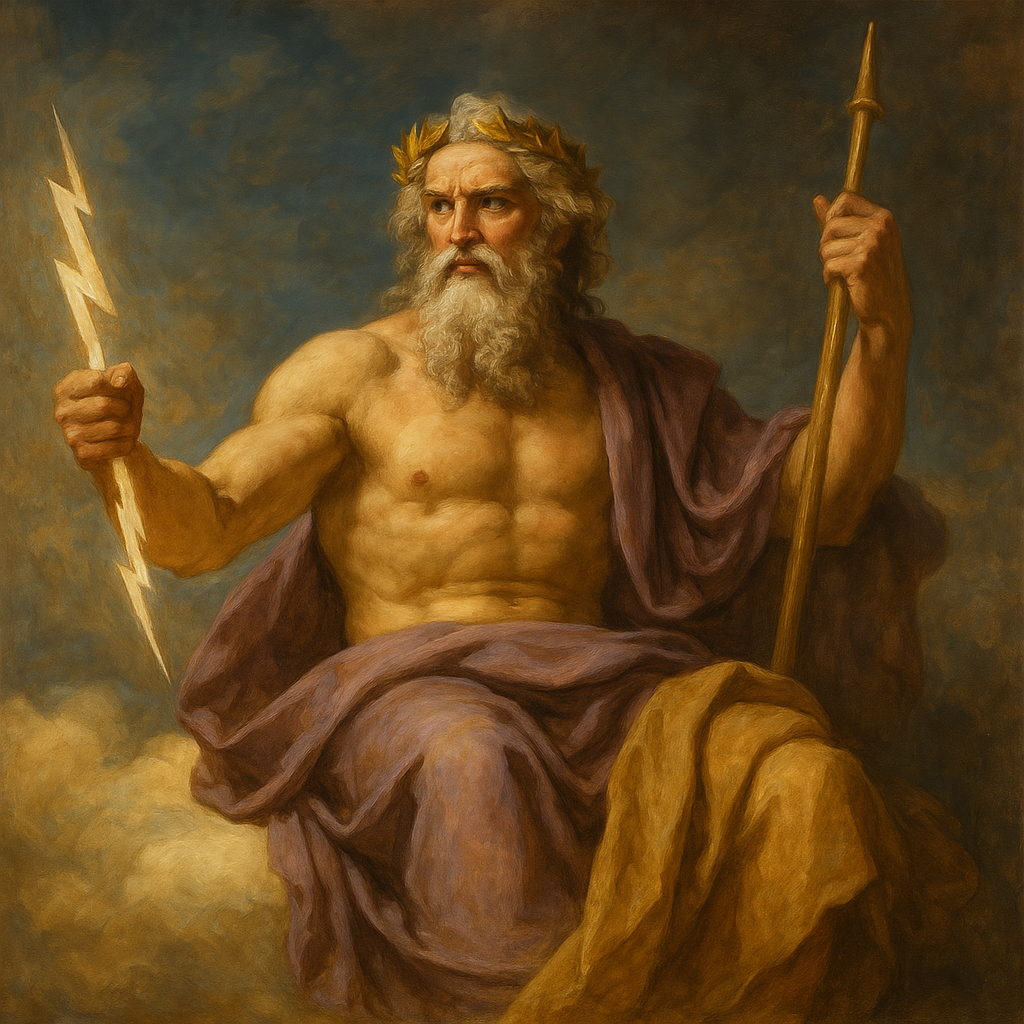Overview
Zeus, known as Jupiter in Roman mythology, is the king of the Greek gods, ruler of the sky, thunder, lightning, and divine law. As the supreme deity of Mount Olympus, Zeus governs over gods and mortals alike, maintaining order, justice, and cosmic balance. Revered as the all-seeing father and the enforcer of oaths, he wields tremendous power, both benevolent and wrathful. Despite his regal authority, Zeus is also a deeply complex figure, involved in countless mythic dramas that shape the destinies of gods, heroes, and humankind.
Origins and Mythological Role
Zeus is the youngest son of Cronus and Rhea, born during a time when Cronus, fearing that his children would overthrow him, swallowed each one at birth. Rhea saved Zeus by hiding him in a cave on Mount Ida or Mount Dicte in Crete and giving Cronus a stone wrapped in cloth.
When grown, Zeus forced Cronus to regurgitate his siblings—Poseidon, Hades, Hera, Demeter, and Hestia—and led them in the Titanomachy, the great war against the Titans. After their victory, the universe was divided:
- Zeus took the sky and heavens
- Poseidon ruled the sea
- Hades governed the underworld
From this moment on, Zeus reigned as the chief deity of the Greek pantheon, upholding divine order (known as Themis) and overseeing the moral conduct of gods and humans.
Symbols and Iconography
Zeus is typically portrayed as a powerful, mature man with a regal presence, exuding strength, authority, and wisdom.
Common Symbols
- Thunderbolt – His primary weapon, symbolizing divine power and justice
- Eagle – His sacred bird, representing kingship and divine sight
- Oak Tree – Associated with strength, endurance, and sacred groves
- Scepter – A symbol of sovereignty and command
- Throne – Depicting his status as ruler of Olympus
He is often depicted:
- Seated or standing atop a mountain, holding a thunderbolt or scepter
- With an eagle at his side or in mid-flight
- With storm clouds or lightning in the background, asserting his dominion over the sky
Attributes and Powers
1. Supreme Ruler and Lawgiver
Zeus enforces divine law, cosmic order, and justice. He oversees the oaths of gods and mortals, punishing those who break sacred promises. As a moral overseer, he maintains harmony in the cosmos and on Earth.
2. God of Thunder and Sky
As the lord of the heavens, Zeus commands storms, winds, rain, and lightning. He is the source of divine inspiration and the power behind weather, seasons, and the elemental forces of the sky.
3. Guardian of Hospitality and Social Order
Zeus is also known as Zeus Xenios, protector of hospitality and the rights of guests and strangers. Violations of hospitality were seen as offenses against him.
4. Fertility and Patriarchal Power
Zeus was known for his numerous love affairs, both divine and mortal, which resulted in the birth of many major gods, demigods, and heroes. Though often criticized for his infidelity, these unions symbolized his role in perpetuating life, power, and divine lineage.
Key Myths and Stories
Zeus and the Titanomachy
After freeing his siblings, Zeus led them in war against the Titans. The Titanomachy culminated in the Olympian gods overthrowing the old order, with Zeus establishing a new divine hierarchy.
Zeus and Prometheus
Zeus punished Prometheus for stealing fire and giving it to humanity. This myth reveals Zeus’s role as an enforcer of divine boundaries, as well as his sometimes stern and authoritarian nature.
Birth of Athena
After swallowing his first wife, Metis, to prevent a prophecy of being overthrown by their child, Zeus later experienced a terrible headache. From his head emerged Athena, fully grown and armored—symbolizing the birth of wisdom from divine mind.
Zeus and Europa / Leda / Io / Semele
Zeus’s romantic pursuits are central to Greek myth. Often taking different forms (e.g., a bull, a swan, or a shower of gold), he fathers heroes such as Heracles, Perseus, Dionysus, and others. These stories represent the fertile, initiating force of divinity entering the mortal realm.
Temples and Worship
Major Temples
- Olympia – Home of the Temple of Zeus, featuring one of the Seven Wonders of the Ancient World: a massive statue by Phidias
- Dodona – A sacred oracle site where Zeus was worshipped through the rustling of oak leaves and the voices of priestesses
- Athens and Pergamon – Cities that housed important altars and temples to Zeus Olympios
Rituals and Offerings
- Sacrifices of white bulls, rams, and other sacred animals
- Libations and prayers offered for divine favor, victory, and justice
- Olympic Games – Held in Zeus’s honor, symbolizing athletic excellence and divine approval
Zeus was widely venerated across all of Greece, often invoked in legal matters, governance, and oaths.
Spiritual and Archetypal Significance
In modern archetypal and psychological traditions, Zeus represents:
- The Ruler Archetype – Authority, vision, leadership, and divine right
- The Father Figure – Provider, protector, and at times, disciplinarian
- Divine Order and Justice – Upholding moral law, balance, and cosmic structure
- Creative Fertility and Divine Masculinity – The seed of power and transformation within the mortal and divine worlds
He is invoked for:
- Leadership and clear decision-making
- Support in governance, law, or social responsibility
- Protection of sacred vows and boundaries
- Divine masculine healing and empowerment
Conclusion
Zeus, the king of the gods, embodies the cosmic authority that rules with both thunder and wisdom. His power sustains the sky, upholds justice, and defines the moral fabric of mythic reality. As a father, lover, enforcer, and lawgiver, Zeus represents the dynamic interplay of strength, order, and divine presence. In invoking Zeus, we are reminded of the sacred responsibility of leadership, the importance of truth, and the enduring force of divine will behind the world’s unfolding order.

